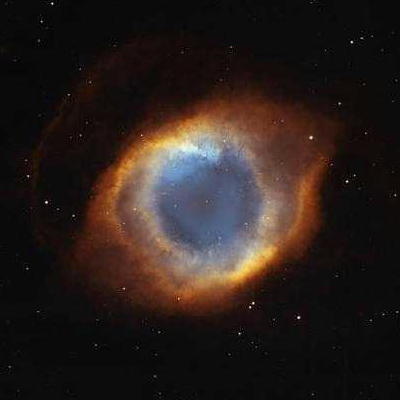


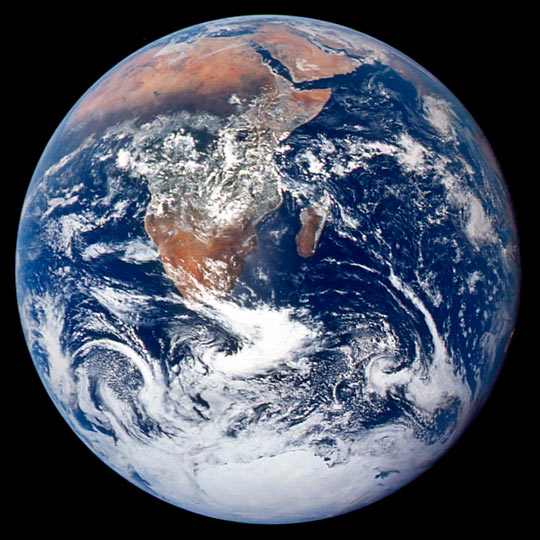


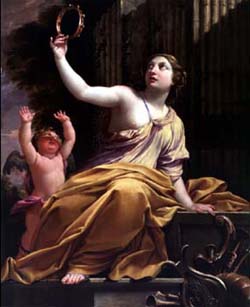
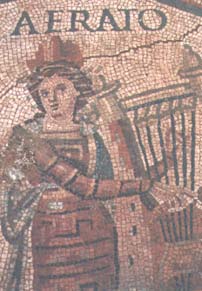
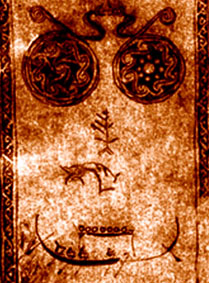
Elder, Today, a session wiser
And fainter, too, as Wiseness is —
I find myself still softly searching
For my Delinquent Palaces —
And Suspicion, like a Finger
Touches my Forehead now and then
That I am looking oppositely
For the site of the Kingdom of Heaven —
—Emily Dickinson
On a Nun—Jacopo Vittorelli
Of two fair virgins, modest, though admired,
Heaven made us happy; and
now, wretched sires,
Heaven for a nobler doom
their worth desires,
And gazing upon either,
both required.
Mine, while the torch of Hymen newly fired
Becomes extinguish’d,
soon—too soon—expires:
But thine, within the
closing gate retired,
Eternal captive, to her
God aspires.
But thou, at least, from out the jealous door,
Which shuts between your
never-meeting eyes;
May’st hear her sweet
and pious voice once more:
I to the marble, where my daughter lies,
Rush,—the swoln flood of bitterness I pour,
And knock, and knock, and
knock—but none replies.
(translation above by Lord Byron)
On a Nun
We had two daughters, my friend,
Pearls, not diamonds;
lustrous, not bright
Still some jealous god
envied us the sight,
Took by force what we
could not defend.
My own dear child from her newmade marriage bed,
Gone to a place beyond a
father’s care;
Yours, to her god, as
well as dead,
Held captive by an
eternal prayer.
Your loss, my friend, I know seems great,
But there is solace for
your pain,
A small, still voice
behind the grate.
I on marble long have lain,
Shed bitter tears to
bitter fate,
And called, and called,
and called in vain.
(transcripted from Byron by Jim Boring)
Can we believe the accounts of the Bible? Men like Methuselah who lived for
over 900 years? Who would want to live that long and be that good?
Inquiring minds like Richard Moore's want to know ...
The Saints—Richard Moore
What do we mean by the sweet saints, singing at peace in the Heavens,
free of our curse, old age?
Men in the Ages of Gold—
can it be true that they lived for a long time? Maybe it only
seemed long. What if they aged
rapidly, happy to die?
Then to themselves they would live long, seemingly almost forever.
If they had perfectly lived,
wouldn't they willingly die,
just when the slightest decrepitude told them the party was waning?
Only unsatisfied guests
hate to relinquish the feast,
lingering overexcited, like children refusing their bedtime,
having experienced too
much for the day to absorb,
so they are querulous now for the unfelt toys that escaped them.
Greed and unsatisfied lusts
give me my terror of death.
Shy Amazonian Indians don't live long by our standards
and, as a rule, by their mid
thirties they're tired of life—
which in their tropical jungle is placid, desireless, easy—
and, when their prime's past, die
painlessly as they were born.
Civilized people, describing them, find this tendency shocking;
what is it, though, but a true
image of Heavenly bliss?
Living forever: what's that but to live for as long as you want to?
Surely our clinging to life
catches this agony, age.
When we are freed from desires, than we, too, climb into Heaven,
we, too, live as the old
Patriarchs did, without age.
From Pygmies and Pyramids by Richard Moore;
originally published in Sewanee Review.
Of course, poets have always been suspicious of those who claim to know and
do God's will, especially when war and mayhem are involved ...
The Pentagon Version of "Onward Christian Soldiers"—Jim Dunlap
Mistletoe and holly, turkey, pumpkin pie,
Candied yams and all the trimmings,
Don't speak to us of Christ's beginnings —
How we've gathered here—and why.
The clouds of evil hover near us,
But we choose to disregard, because
We're anticipating Santa Claus,
And the world has cause to fear us.
Such good people surely can't do wrong —
God is on our side—they'll finally learn;
Or their cities, and their souls, will burn.
So, why not relax, and sing along?
"Onward Christian soldiers, flay them —
If they're not like us, go out and slay them."
Trapped between heaven and hell, between an uncertain beginning and an unknown
end, poets often find strength in adversity, in the Divine, within themselves ...
They say that "Time assuages" —
Time never did assuage —
An actual suffering strengthens
As Sinews do, with age —
—Emily Dickinson
Exhilaration—is within —
There can be no Outer Wine
So royally intoxicate
As that diviner Brand
The Soul achieves—Herself —
To drink—or set away
For Visitor—Or Sacrament —
—Emily Dickinson
The poet's telescope and microscope would see all, if it were possible ...
I made my soul familiar —
with her extremity
—Emily Dickinson
And grasp at life with calloused or delicately-manicured fingers ...
I felt my life with both my hands
To see if it was there —
—Emily Dickinson
Finding life a curious elixir of mingled hope and despair, of miracles and
"commonplaces" ...
Is this the Hope that opens and shuts,
like the eye of the Wax Doll?
—Emily Dickinson
I took one Draught of Life —
I'll tell you what I paid —
Precisely an existence —
The market price, they said.
—Emily Dickinson
And all the while the poet wonders if others see, or understand, or even bother
to look for, or take a stab at knowledge ...
As we pass Houses musing slow
If they be occupied
So minds pass minds
If they be occupied
—Emily Dickinson
The unexamined life is not worth living.—Socrates
Only to find the oddest occupant of all ...
We meet no Stranger
but Ourself.
—Emily Dickinson
With perhaps the even odder encouragement that such oddness must be of great
interest to God ...
Then—on divinest tiptoe—standing —
Might He but spy the lady's soul —
—Emily Dickinson
And the poet postulates, or at least examines the possibility of, a unique form
of immortality ...
A Letter always seemed to me
like Immortality,
for is it not the Mind alone,
without corporeal friend?
—Emily Dickinson
The poet is not beyond paranoia (if it is paranoia), or the use of the
paranoiac's "they." Sometimes it seems the sole purpose and obsession
of organized religion is to slam the gates of heaven in the faces of
"sinners." Sinners being, of course, everyone except themselves and
their ilk ...
Why—do they shut Me out of Heaven?
—Emily Dickinson
The poet is an odd creature who can see both the potential dangers of heaven and
the possible charms of Hell ...
A Thunder storm combines the charms
Of Winter and of Hell.
—Emily Dickinson
Heaven will not be as good as earth,
unless it bring with it
that sweet power to remember,
which is the Staple of Heaven—here.
—Emily Dickinson
What once was "Heaven"
Is "Zenith" now —
—Emily Dickinson
Elder, Today, a session wiser
And fainter, too, as Wiseness is —
I find myself still softly searching
For my Delinquent Palaces —
And Suspicion, like a Finger
Touches my Forehead now and then
That I am looking oppositely
For the site of the Kingdom of Heaven —
—Emily Dickinson (repetition intended)
And even recognize that earth, with all its warts, retains something of Eden
...
Eden is that old-fashioned House
We dwell in every day
Without suspecting our abode
Until we drive away.
—Emily Dickinson
The poet may be perplexed at being "too lifted" (perhaps meaning too
much inspired) by her own "little Circuit" and "little
Well," but how thankful we readers are for the results ...
I should have been too glad, I see —
Too lifted—for the scant degree
Of Life's penurious Round —
My little Circuit would have shamed
This new Circumference—have blamed —
The homelier time behind.
— Emily Dickinson
I know where Wells grow —
Droughtless Wells —
I think a little Well—like Mine —
Dearer to understand —
—Emily Dickinson
In the end, the poet is like a bee pollinating the earth's future
transcendent flowers, both knowing and unknowing (Dickinson was nigh unknown and
unread in her own day) ...
How many Flowers fail in Wood —
Or perish from the Hill —
Without the privilege to know
That they are Beautiful—
How many cast a nameless Pod
Upon the nearest Breeze —
Unconscious of the Scarlet Freight —
It bear to Other Eyes —
—Emily Dickinson
My best Acquaintances are those
With Whom I spoke no Word —
—Emily Dickinson
The honest poet knows others have done what she has only thought and said
...
Feet, small as mine—have marched in Revolution
Firm to the Drum—
Hands—not so stout—hoisted them—in witness—
When Speech went numb—
Let me not shame their sublime deportments—
Drilled bright—
Beckoning—Etruscan invitation—
Toward Light—
Contemporary poets and friends of The HyperTexts have much worth hearing to say
about "things mysterious" ...
Meister Eckhart's Christmas Sermon
— Lee Evans
O Christians! What good
Behooves you to kneel
At mangers of wood
To praise the unreal?
Lullaby, goodnight,
A Savior is born
To waken the Light
Within us this morn.
Your god and your soul
Are figures of speech!
To that which is whole,
Mere words cannot reach.
Lullaby, goodnight,
A Savior is born
To waken the Light
Within us this morn.
And whoso lays waste
To self, he deserts
All semblance and taste
Of pleasure or mirth.
Lullaby, goodnight,
A Savior is born
To waken the Light
Within us this morn.
Then out of the void
A Word came to me,
And spoke of a joy
Too deep to be seized.
Lullaby, goodnight,
A Savior is born
To waken the Light
Within us this morn.
People calling themselves Christians—Eric Nunnally
Pain draws beautifully ...
Subjects breathe easier, being told how to pose
And daydream as on lazy afternoons, their peace borrowed
From a generous bank of ignorance
Sometimes confused with
Faith …
I’ve seen pictures of their campfires
Where they’ve confused people
For marshmallows
And crosses for firewood
Pose anyway, smiling, safe in the mentality of
The way people think in groups
Like sheep
With no shepherd
They are lovely people with happy faces
Carrying God on wallet inserts, softened from the heat of back pockets
On wristbands, dirty with sweat and sloughed-off skin
Delicately chained around their necks, a memento of an execution
The idea of suffering is something they keep close
Their Bibles are leather bound with gilded pages
They memorize the words, as if from a famous poem
And recite those words
Because repetition means something
But like so many kids with good grades after an exam
They still don’t understand
A superstitious lot
They are afraid of being wrong
And cling to their rights, truth be damned
And say, “Praise the Lord! Brother and sister, and Amen!”
Even when I see through their smiles
Into their hearts
And know them not
The Weekday Song—Lee Evans
The hunchback hobbled homeward
At twilight one fine day,
And spied a band of fairies
A-dancing in his way
On Monday, Tuesday, Wednesday.
"Come dance with us, O hunchback!"
They shouted from their ring.
"Come sing the Song of Weekdays,"
The very song we sing
On Monday, Tuesday, Wednesday."
The hunchback joined their circle,
And hand in hand he danced,
The fairy queen his partner,
Exulting in a trance
On Monday, Tuesday, Wednesday.
The fays were so delighted
The hunchback danced so well,
They took the hump that stooped him
And blessed him with a spell
On Monday, Tuesday, Wednesday.
Though crooked he had joined in,
He parted from them straight;
And no one recognized him
When he came home so late
On Monday, Tuesday, Wednesday.
The night was young; the fairies
Commenced again their reel,
All in the merry moonlight,
In all their joy revealed
On Monday, Tuesday, Wednesday.
Along then came a tailor,
A bold and handsome man
Who stepped up to the dancers,
And pushed into their band
On Monday, Tuesday, Wednesday.
He gave the queen a sly wink,
And rudely wrapped his arm
About her fairy shoulders,
And chanted with the charm
Of Monday, Tuesday, Wednesday.
And so this foolish person
Cavorted with the fays,
Until he added
Thursday,
Friday, and Saturday
To Monday, Tuesday, Wednesday.
Then everything got ugly.
The fairies held him down
And clapped the hump upon him
The hunchback had disowned
On Monday, Tuesday, Wednesday.
Now you who hear this story
It may be are forewarned:
The humble are made perfect,
The vain become deformed,
On Monday, Tuesday, Wednesday.
God's Little Joke Aside—Laurel Johnson
God knew the sort of music
it would take to make my heartsong
swell, maintain itself through every season.
You. He threw you at me,
then sat back to watch the fireworks
like I was his personal July Fourth celebration.
No man had ever turned me on before.
(My grandma said I was a spinster,
without a man at twenty three,
engrossed in my profession
instead of hatching babies
to enlarge the family tree.)
First time we met, fine lanugo
arced with electricity
so fierce I looked for burn marks
later in the mirror as I cried,
then finally vomited in desperation.
You went across the ocean
to some foreign land and all I could remember
was your hand, the way it casually
caressed my shoulder when you said goodbye.
I couldn't cry or eat, avoided sleep,
imagining that you might die and I
would never know what it was like
to have you sleep beside me
or bring to life inside me what I knew
was lying dormant, waiting.
You returned, determined to enjoy a ten course dinner —
me—as your reward for bravery beyond the call of duty.
Medals for valor covering your chest
were not enough. You wanted something warm
to prove that you were still alive.
Oh I can't go on with this.
Please don't make me reminisce.
You know the way our story went
and so do I. Don't make me cry.
God got his fireworks, enjoyed the show
awhile, then struck a vicious blow
just to prove he could.
Now nothing's good,
not wild and sweet between us like before,
but God's little joke aside,
it was fun while it lasted.
Piecemeal—Laurel Johnson
The preacher pontificated about how we humans
with our limited understanding
correlate God's ways to those of our earthly fathers.
No wonder I'm dysfunctional, imagining
God in his omnipotence wreaking drunken havoc
through the Universe, abusing helpless children,
breaking most of the Ten Commandments
and beating the crap out of any single person
with the nerve to criticize him.
I've studied every promise God ever made
in the Old Testament, words cast in stone
or whispered in the ears of chosen prophets
wearing ragged robes. I've taken prophecies apart
and contemplated meanings veiled in mystery.
I know God is a jealous God, jealous like my earthly
father.
I know God turned a woman into salt for disobeying.
A painless transformation into salt is nothing compared
to what MY father dishes out for disobeying.
Yes, I know God set a bush on fire and told a loving
father to burn his son alive, then changed his mind
at the last minute. My dad used lighted cigarettes
or horseradish hidden in the mashed potatoes
as my burning punishment, but seldom had a change of
heart
or kindly turn. He liked to burn and punish,
rarely forgave, and always dealt a painful vengeance.
Perhaps he can't destroy a city or a country like Our
Father
up in Heaven. No, he does it one person at a time, piecemeal —
a woman, then one by one her children.
You Who Sleep Soundly Through Our Bleakest Hour —Rhina
P. Espaillat
You who sleep soundly through our bleakest hour,
who hear the meekest cry, and turn away,
who ride the river, blessing it with power
to cancel what we've made day by slow day;
You whom we cannot know nor flee, who hide
behind your countless aliases, who bear
the weapon of your absence like a tide
against our helplessness, and fail to care;
You who stand by while madness picks the lock,
stroke cuts the wires, tumor rigs the mine:
Look how we scour the earth to find—in rock,
in fire, in word—your signature, some sign
of you in thought that quarrels with your will,
and as it quarrels, hungers for you still.
God?—Harvey Stanbrough
If you are there, bequeath a gentle snow
to blanket grass and hills and trees and us,
the weary ones who really need to know
if you are there. Bequeath a gentle snow,
and let it drift to comfort us below
these endless marble rows, victorious.
If you are there, bequeath a gentle snow
to blanket grass and hills and trees and us.
Breaking the Tenth, Mowing—Harvey Stanbrough
"Thou shalt not covet thy neighbor's house...
nor his ass, nor anything that is thy neighbor's."
— Moses, Exodus 20:17
We stroll across the grass together, tied,
machine and I, together at the hip,
making the outward appearance that I'm in charge,
albeit of a friendly partnership.
My neighbor mows his lawn in comfort, kingly,
sitting, riding as I strain and sweat
and shove. "To get my exercise" I say,
then smile and covet, for the briefest moment,
my neighbor's ass, or rather its location,
seated as it is upon the throne
of his machine, whirring beneath him gaily,
measuring the world to one trim height.
Escaping the Light of Day—Mary L. Mazzocco
I dream my life away.
Escape the hell of wakefulness,
trapped by the light of day.
Is it wrong, who's to say?
In somnambulant bliss,
I dream my life away.
Escape—go where I may.
In the night, adventuress,
trapped by the light of day.
The dawn is always gray.
Gathered into nothingness,
I dream my life away.
Reality came to stay.
Detained me in willfulness,
trapped by the light of day.
Reverie leads the way,
casts nets of happiness.
I dream my life away,
trapped by the light of day.
Grace and Sorrow — Mary L. Mazzocco
Two women grieve in quiet night
Nocturnal breezes pause, to listen
And share their loss with kind insight
Two women grieve in quiet night
As Venus watches, ever-bright
From sky above where moonlight glistens
Two women grieve in quiet night
Nocturnal breezes pause, to listen
Spent petals rustle calm release
Their time is now, there’s no tomorrow
They’ll pass this life, decay with ease
Spent petals rustle calm release
They’ve played their role as nature pleased
They share the women’s tears and sorrow
Spent petals rustle calm release
Their time is now, there’s no tomorrow
In faith, the constellations blaze
Celestial graces never end
Eternal spirit, white-hot gaze
In faith, the constellations blaze
One woman weeps, the other prays
Their grief and loss shall not transcend
The faith of constellations' blaze
Celestial graces never end
Lennon Was No Plastic Ono—Jim Dunlap
It's been some time, but we'll never forget
the man and his lyrics—"Let It Be"
wasn't really his game—the John we met
could "Imagine" much more than we'd see.
He believed in justice and dignity,
fought for the down-trodden poor and oppressed,
worked to eradicate all bigotry,
and brightened his age—we were blessed.
Imagine no religion, hounding men to hell,
no prejudice marring humanity's rest,
no darkness embracing the blasting knell
of evil, destroying our khaki-clad best —
imagine the peace love's practicing yields —
envy John, sleeping in Strawberry Fields,
forever ...
A Proof of Love
NOW WHEN I was fresh and easy, I would go
to Church ... devotion fill’d my soul with tears.
I guessed not all Gospels could so tiresome grow—
the same words repeated for twice a thousand years.
But middle-aged I have become aware
of all the paranoia, boredom, pain,
where with lame hands I grope ... of empty air
and dust, and chances lost, and littlest gain.
Yet here I am, my God, where I relax
in warmth of heaters, and Thy glowing smile,
where words, repeated, securer are than cheques,
the Love which then I felt, now lost awhile.
Thus We gave God, Whose Love does not change the story,
a proof of Love—seal of eternal glory!
From Songs of Gentlest Reflection, copyright © Joe M. Ruggier, 2003, 2004